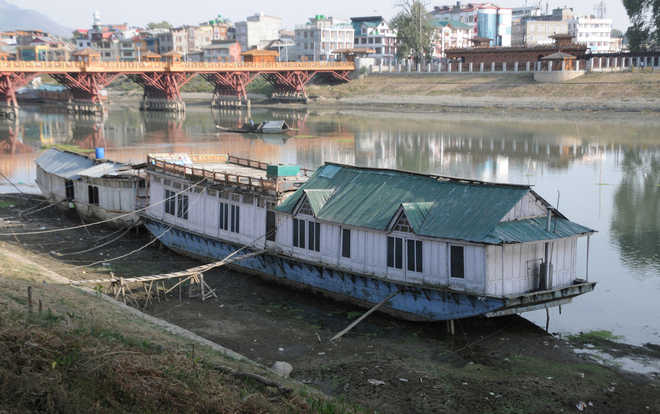700 of 1,681 supply schemes affected, Jhelum flowing at record low level
For the first time, Kashmir is battling an acute drinking water crisis as over 700 water supply schemes have been affected because of scanty precipitation in the past six months.
Of the 1,681 water supply schemes in Kashmir, officials say that over 700 are badly hit as the Jhelum —- the main source of drinking water in Kashmir —- is flowing at a record low level in the past six decades. “Unprecedented water crisis is unfolding in Kashmir due to continuing spell of dry weather. We are improvising on available resources by resorting to a long-curtailment schedule,” said an official of the Public Health Engineering (PHE).
The reducing water level in the Jhelum —- which traverses from south to north Kashmir —- has forced the authorities to block its flow near the Chattabal locality here to manage the crisis in the city. The barrier to the water flow in the Jhelum has, however, aggravated the crisis in north Kashmir, where taps are running dry for the past several weeks.
“We have never seen such crisis in our area. Our women have to travel long distances to fetch water from a spring which doesn’t suffice our drinking water need,” said a woman from Nowpora village in Baramulla district.
People of Budgam, Kupwara and Bandipora districts, where the government has failed to provide adequate safe drinking water, are also facing a similar situation.
The Jhelum originates from Verinag spring in south Kashmir and flows through Srinagar to north Kashmir. It is fed by at least a dozen tributaries, which source themselves from melting glaciers and rainwater.
However, the river water has dipped to minus 0.75 feet at Sangam in south Kashmir, which is the lowest in its recorded history, as long dry spell continues.
Officials say that it is the river’s lowest water level since 1955 when the Irrigation and Flood Control Department began maintaining a record. They said the dip in the Jhelum’s water flow also decreased the quantity of dissolved oxygen in it, resulting in thousands of fish coming ashore recently.
PHE Chief Engineer Abdul Wahid said they had taken measures to supply drinking water to the people. “We are hopeful of a rainfall in the next two days which will increase the water level in the Jhelum and other sources. We have put 102 water tankers into service to supply water in Kashmir,” Wahid said.




